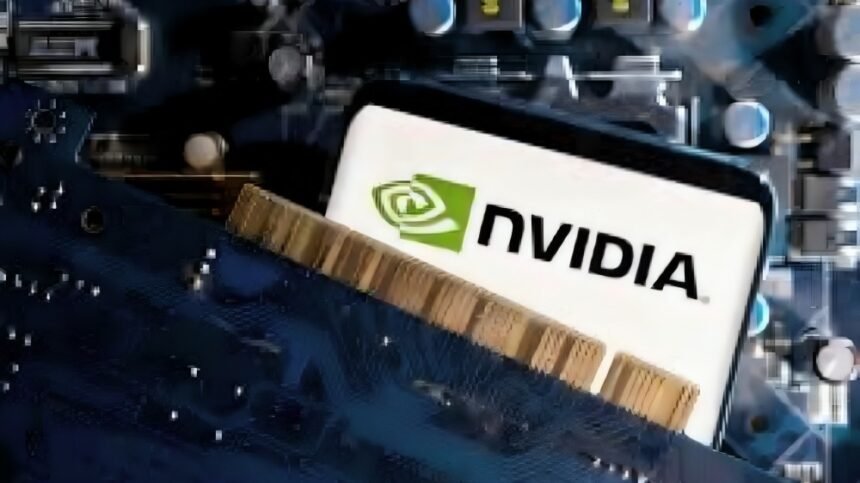Scaled-Down Blackwell Chip Deal Takes Shape
The Scaled-Down Blackwell Chip Deal is making headlines as Nvidia and the Trump administration discuss allowing advanced but reduced-capacity AI chips to enter China’s market. Nvidia CEO Jensen Huang said the negotiations are ongoing but emphasized that the approval process will take time.
The move could reshape global AI competition. The Blackwell chip is Nvidia’s most powerful design to date, but to address U.S. national-security concerns, the proposed China version would be 30–50% less capable. Despite restrictions, the potential to access China’s massive AI demand has sparked fresh optimism among investors and industry leaders.
Trump’s Support and America’s AI Strategy
Former President Donald Trump has shown support for the scaled-down approach, framing it as a way to extend U.S. influence through the American tech stack while maintaining control over sensitive technologies. For Washington, the deal represents a balancing act enabling American companies to profit while safeguarding national interests.
This debate highlights a broader theme in U.S.–China relations how to balance economic opportunity with strategic caution. Huang, however, is firm in his belief without China, the United States risks losing its global leadership in AI.
Nvidia’s China Market Opportunity
Although Nvidia excluded potential Chinese revenue from its latest quarterly forecast, the company has made no secret of China’s importance. Huang described the China AI market as a potential $50 billion opportunity, underlining how critical it is for Nvidia’s long-term growth.
China is already building some of the world’s most advanced AI systems. Gaining access, even with reduced chip capabilities, could position Nvidia as a key player in shaping the country’s AI landscape. The Scaled-Down Blackwell Chip Deal would allow Nvidia to tap into this market without directly exporting its most sensitive technology.
A Look Back: The H20 Chip Precedent
This is not the first time Nvidia has had to adjust its technology for China. Previously, the company created the H20 AI chip specifically designed to comply with U.S. export rules. In exchange for securing the license, Nvidia agreed to share 15% of revenue from Chinese sales with the U.S. government.
That arrangement set a precedent for how Washington might structure future approvals. Asked about whether a similar deal could apply to the Blackwell variant, Huang responded that Nvidia would do “whatever it takes” to move forward.
Strong Results, Lingering Uncertainty
Financially, Nvidia remains one of the fastest-growing companies in the world. The company posted a 56% year-on-year revenue increase to around $46.7 billion in its most recent quarter and projected $54 billion for the next quarter.
Despite the stellar numbers, uncertainty over China continues to weigh on expectations. Investors want clarity on whether the company can fully participate in China’s AI build-out. That question now hinges on how quickly Washington finalizes terms of the Scaled-Down Blackwell Chip Deal.
Geopolitical Risks Remain
While the potential rewards are massive, the risks remain equally high. China has been working on domestic AI chips to reduce reliance on U.S. suppliers, and American lawmakers remain cautious about giving too much technological ground.
Nvidia is caught in the middle trying to satisfy shareholders eager for growth, while staying compliant with shifting U.S. regulations. If Washington approves the scaled-down version, it could open a pathway for other U.S. chipmakers to strike similar deals. If not, China may accelerate efforts to build competitive chips domestically, cutting Nvidia out entirely.
What’s Next for Nvidia?
For now, Huang has asked investors for patience, noting that these negotiations are complex and politically sensitive. Still, he remains optimistic that a workable deal will emerge.
The Scaled-Down Blackwell Chip Deal could become a model for how the U.S. balances innovation, profit, and security in an era where AI is increasingly viewed as a strategic asset. If approved, Nvidia could strengthen its foothold in one of the world’s largest AI markets while helping the U.S. maintain influence over global technology standards.
A Defining Test for U.S. Tech Policy
Ultimately, the talks highlight a defining test for U.S. tech policy in the 21st century: how to remain competitive in a global AI race without sacrificing national security. Nvidia’s role in this balancing act is critical.
As the China AI market continues to expand, and demand for cutting-edge chips surges, the pressure on policymakers to finalize decisions will only grow. Whether through revenue-sharing, capacity limits, or future innovation partnerships, the path forward will set the tone for years of U.S.–China tech relations.
A Turning Point for AI Exports
The Scaled-Down Blackwell Chip Deal reflects more than just a corporate negotiation it represents a crossroads for technology, geopolitics, and economics. For Nvidia, it could unlock billions in growth. For the U.S., it could reinforce its influence in the global AI landscape.
While the details are still under discussion, one thing is clear: the outcome will shape the next chapter of AI development and global competition. Investors, governments, and tech leaders alike are watching closely as Nvidia and Washington try to strike a balance that works.






